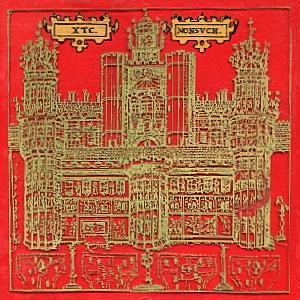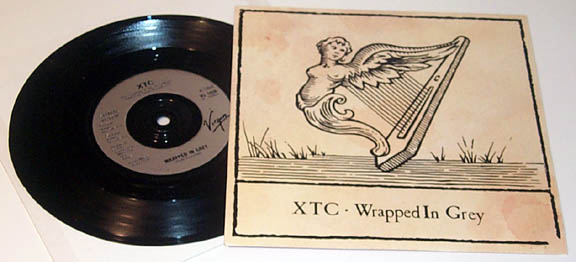A history of the middle ages
As the eighties ended and the Berlin Wall fell, the
band settled back into life in Swindon, with Colin playing his favourite role –
homemaker – and Andy being his usual ubiquitous production whore, doing work
for The Mission, Lilac Time, Peter Blegvad, Marc Almond and Johnny Hates Jazz!
By 1991 another album had been written, which Andy
dubbed “The Last Balloon”. Oranges & Lemons had convinced all parties that
they should return to recording in England – much to the relief of the Moulding
family. Andy now had two young kids also – Holly and Harry – and he didn’t want
to miss their childhood as Colin had missed much of Lee’s and Joanne’s.
Using former Fairport Convention drummer, Dave
Mattacks, they booked Steve Lillywhite and Hugh Padgham to produce and
engineer. As a team, these two had scored huge hits throughout the 80s with the
likes of Genesis.
However, Lillywhite dropped out at the last minute to
sort out his ailing marriage to Kirsty McColl and Padgham wouldn’t go it alone.
There they were with all the recording time booked and no producer, until
Mattacks suggested Gus Dudgeon – a wonderful English eccentric and raconteur
who has forgotten more about producing than most people will ever know. His list
of credits reads like a who’s who of British stars – Bowie, Elton, Queen,
Clapton . . . and The Bonzo Dog Doo-Dah Band. The final one swung Partridge and
Moulding.
Andy claims his instincts have saved XTC from a
number of disasters – so why he chose to ignore them at this point, even he
can’t say. He knew the moment Dudgeon creaked out of his blue Aston Martin –
four hours late – in his tight leather trousers, cricket sweater (he was
pushing 50) and expensive cologne, that this wasn’t going to work. But he felt
“this was so wrong it had to be right.” He was wrong.
Andy: "He'd read about me and Todd so
immediately adopted this Mr Amiable stance. Gus is old school, full of blusters
and bluff – 'Elton gave me this Rolls-Royce and I said, Oh Elton darling. . .'
We called him Guff Dungeon because he was so flatulent. 'Are you going in the
Guff Dungeon yet?' 'Let's give it half an hour, eh?'"
For his part, Dudgeon recalled, "You can flip
between thinking Andy's superb and wanting to fucking kill him, in a matter of
minutes. Half the time he doesn't realise the effect he's having on
people."
The two worked like dogs to get the album going, but
Gus had heard Andy was awkward and had come in armed with a heavy supply of
vitriol for “uppity artists”. Andy, for his part, saw this developing into
another “Todd Rundgren” situation – and despite Skylarking’s success, Andy had
vowed he would never again lose artistic control like he did on that album.
When Dudgeon suggested dumping the track Rook, one of
Andy’s personal favourites, the battle lines had been drawn. However, during
the recording, things stayed civil – in fact, the merry banter and in-studio
wit between the two (which, according to some, the late Dudgeon kept on tape
and regularly entertained party guests with) was worth the price of admission
alone.

|
However, when Dudgeon told Andy he didn’t want him at
the mixing sessions, Andy flatly refused to stay away. Gus was insistent on
producing the album his way – but eventually even Virgin weren’t happy with what
he was doing to the tracks. For the first time in their career, the band sacked
a producer before the finish of the album. In came Genesis engineer Nick Davis
and, with a swish of fairy dust was born Nonsuch (right)
– named after a palace
supposedly built by Henry VIII, who destroyed a whole village in the process.
As with Mummer there seems to be
some debate as to the status of Nonsuch in the pantheon of XTC releases, but to
this humble consumer there is very little here that fails to inflate my
proverbial dinghy. Seventeen tracks, none of which suck, and numerous of them
classics, Nonsuch was a gem – and a damn long gem at that. The seventeen tracks
are best heard from start to finish, with minor classics peppering the whole
show.
|
The Ballad of Peter Pumpkinhead is another Partridge narrative number one that never
was, and brought XTC briefly back into the public eye by scraping the lower
reaches of the top 100 (it was later murdered by the Crash Test Dummies and hit
the top 20!). Andy said of it, "he's every hero, every politician, every religious leader
who's far too good to be true and by telling the truth becomes a martyr. Is
Peter Pumpkinhead Jesus or JFK or Buddha? Actually the name's from a
jack-o-lantern I carved. After Halloween, I stuck it on a fence post in my
garden and every day I'd go past it on my way to my composing shed. And every
day it would decay a bit more. I felt so sorry for it, I thought I'd make it a
hero in a song."
Dear Madam Barnum is seen by many as another lament by Andy about his crumbling marriage
– which he denies – while Holly Up On Poppy, an ode to his daughter on
her rocking horse, was another example of Partridge’s ability to make the
mundane seem magical.
The difficult, brooding Rook is Andy’s most
perfect nursery rhyme – and if you remember singing London’s Burning as a ‘round’ when you were a kid, check out what
Andy does with the strings on this one. This anthem to his own mortality began
as a set of dark chords discovered whilst noodling on his daughter’s
three-quarter size guitar in his back garden deckchair.
The chords led him to the (not unreasonable)
realisation that he was going to die sometime – which led to the lyrics of the
soul rising out of the body as the bell tolls. "I was frozen with writers block. Then suddenly
this song came out. I was really frightened. I mean, I couldn't even finish the
demo because I was in tears. It felt like seeing yourself in a mirror and
recognising your own mortality. Maybe it's something in the chord changes. I
don't understand the lyrics, which is rather exciting."
That Wave combined
Andy’s lifelong fear of water with the emotion of love – into the sensation of
drowning in a wave of love. This ‘psychedelic grenade’ as Moulding calls it, is
perfectly complemented by one of Dave Gregory’s greatest guitar solos, which
Andy still talks of in awe today. Then
She Appeared was a paean to the birth of daughter Holly, containing lyrics
such as:
Then
she appeared, apple venus on a half open shell
Then she appeared, the first photograph on Fox Talbot’s gel
I was a little frightened, flying with my senses heightened
Cherubim cheered, then she appeared
Then she appeared, as the giggling crew of Marie Celeste
Then she appeared, pale Atlantis rising out of the west
I was a little dazzled, Catherine wheeled and senses frazzled
Know it sounds weird, then she appeared
And the sun which formerly shone
In the clearest summer sky
Suddenly just changed address
Now shines from her blue eyes
Andy: “A slice of whimsy and a chance to mention Fox Talbot. You don't
hear many pop songs invoke the name of one of the founders of photography.”
| Somewhere out there are about 1,000 CD singles of Wrapped In Grey. You’ll see them
periodically appear for ridiculous amounts of money on Ebay – and rightly so.
“It was the great cot-death single – they pressed it and then changed their
minds, such a shame” says Andy, who was so proud of this song he even drew the
storyboard for a never-made video.
His fury at Virgin’s mistreatment of the
track was also about to have serious repercussions. It’s now seen as one of
Andy’s best ever songs, a beautiful, soaring melodic epic about the allowing
the colours in your soul to burst through against those who would drag life
down to the grey and monotone.
|

'Wrapped in Grey' 7 inch single |
Bungalow
was Moulding's finest hour for many years – his finest moment ever according to
Partridge. Memories of childhood holidays in Weymouth (“Swindon-on-Sea”) gave
Colin the inspiration for a tribute to the glorious awfulness of a British
seaside holiday – cheesy organs, sandwiches with real sand and the traditional
white-bread dream of a retirement by the beach. When Dave Gregory found the
welsh male voice choir, the track was complete. “It’s really a little film. A
bit of Mike Leigh-On-Sea,” says Andy.
Books Are Burning, is the perfect concluding track, as good as anything the band has yet
produced. Written in response to the furore over Salman Rushdie’s ‘The Satanic
Verses’ Andy’s passion for freedom of expression shone through. The song
features a fascinating fade-out featuring the duelling guitar solos of
Partridge – all instinct and improvisation, and Gregory – precise, intricate
and note perfect. See if you can work out which is which.
XTC’s understanding of what makes a good tune, a
compelling arrangement, or an engaging lyric were never bettered than on this
album. However, with no
hit singles and no ingenious promotional activities, Nonsuch fared slightly worse than the previous two albums, but
well enough for Virgin to expect a follow-up. The next batch of XTC demos had
already arrived and it looked like business as usual.
For many XTC fans who had grown with the band,
Nonsuch marked the logical progression – beautiful melodies, smart and moving
lyrics and an overall sense of maturity not seen before. But many others saw it
as ‘XTC-Lite’ – the closest they had come to easy listening.
Had they known what was to follow, they would have
treasured Nonsuch far more.
Part 7

